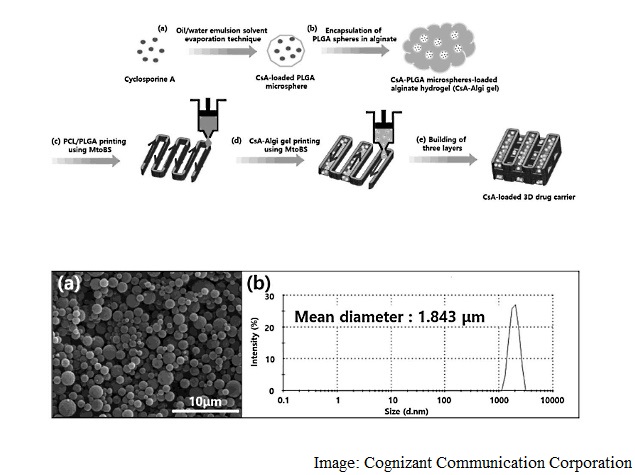- Home
- Science
- Science News
- 3D Printed Carrier Could Soon Deliver Drugs in Humans
3D-Printed Carrier Could Soon Deliver Drugs in Humans

"Our objective was to show the feasibility of using a subcutaneous 3D-printed drug delivery system to achieve local and sustained CsA release and to investigate the local immuno-suppressive effects of the CsA after cell transplantation," said Dong-Woo Cho from Pohang University of Science and Technology, Korea.
"The improved load-bearing capacity of the combined microsphere and hydrogel system, and its ability to maintain its integrity and shape during the implantation period, helped to deliver a sustained CsA release, preventing the acceleration of the secretion of cytokines related to immune rejection," explained Dong-Woo.
The researchers noted that many trials have attempted CsA delivery based on either microspheres or hydrogels, but most encountered serious problems, such as organ damage due to migration of the microspheres from the injection site. Also, weak mechanical properties in several other kinds of systems caused premature dissolution and placed limitations on drug load quantity.
However, the improved load-bearing capacity of the vehicles and improved structure that the Korean team developed allowed the sustained release of CsA at the desired site.
"This research could be a fundamental study for overcoming existing cell transplantation limitations, mainly caused by systemic immuno-suppression," wrote the researchers, who advocated 3D printing technology for a variety of medical applications, including printing membranes of various shapes.
Cell-based therapies often require the use of allogeneic (other human donated) cells or xenogenic (different species donated) cells that can stimulate an immune rejection response, requiring the use of immuno-suppressive drugs to prevent acute transplant rejection.
The introduction of CsA improves the success rate of transplantations, but systemic administration requires high doses of immuno-suppressant that can have severe side effects.
"The benefit of the new 3D printed carrier system is that it provides local rather than systemic drug delivery. The carrier we developed could be a promising solution to treating several diseases that require cell-based therapy, such as muscular dystrophy, degenerative disc disease or myocardial infarction," concluded the researchers.
For the latest tech news and reviews, follow Gadgets 360 on X, Facebook, WhatsApp, Threads and Google News. For the latest videos on gadgets and tech, subscribe to our YouTube channel. If you want to know everything about top influencers, follow our in-house Who'sThat360 on Instagram and YouTube.
Related Stories
- Samsung Galaxy Unpacked 2025
- ChatGPT
- Redmi Note 14 Pro+
- iPhone 16
- Apple Vision Pro
- Oneplus 12
- OnePlus Nord CE 3 Lite 5G
- iPhone 13
- Xiaomi 14 Pro
- Oppo Find N3
- Tecno Spark Go (2023)
- Realme V30
- Best Phones Under 25000
- Samsung Galaxy S24 Series
- Cryptocurrency
- iQoo 12
- Samsung Galaxy S24 Ultra
- Giottus
- Samsung Galaxy Z Flip 5
- Apple 'Scary Fast'
- Housefull 5
- GoPro Hero 12 Black Review
- Invincible Season 2
- JioGlass
- HD Ready TV
- Laptop Under 50000
- Smartwatch Under 10000
- Latest Mobile Phones
- Compare Phones
- Moto G15 Power
- Moto G15
- Realme 14x 5G
- Poco M7 Pro 5G
- Poco C75 5G
- Vivo Y300 (China)
- HMD Arc
- Lava Blaze Duo 5G
- Asus Zenbook S 14
- MacBook Pro 16-inch (M4 Max, 2024)
- Honor Pad V9
- Tecno Megapad 11
- Redmi Watch 5
- Huawei Watch Ultimate Design
- Sony 65 Inches Ultra HD (4K) LED Smart TV (KD-65X74L)
- TCL 55 Inches Ultra HD (4K) LED Smart TV (55C61B)
- Sony PlayStation 5 Pro
- Sony PlayStation 5 Slim Digital Edition
- Blue Star 1.5 Ton 3 Star Inverter Split AC (IC318DNUHC)
- Blue Star 1.5 Ton 3 Star Inverter Split AC (IA318VKU)
















